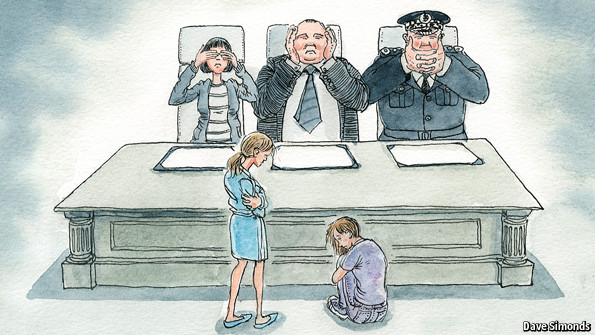Sexual exploitation
See no evil, hear no evil, speak no evil
An utterly shocking—and distinctively British—child sex abuse scandal

OVER the past few years it has sometimes seemed as though no news bulletin goes by without an awful account of child sex abuse. Celebrities and children’s entertainers, including Rolf Harris and the late Jimmy Savile, have been revealed as molesters; so have some teachers and clerics. The latest horror was laid bare on August 26th, in a report into the sexual exploitation of children in Rotherham, a poor northern English town. The report is also painful for what it suggests about race relations in Britain.
The investigation by Alexis Jay, a former chief inspector of social work, uncovers a catalogue of offences, mostly by Pakistani men against white girls. Children as young as 11 were plied with drink and drugs, raped, beaten and trafficked to be abused by men in other cities. One was doused in petrol and threatened with being set alight. Another told the investigation that gang rape was a usual part of growing up in her district. The report estimates that some 1,400 children—some from fragile family backgrounds, some in the care of the state—were abused between 1997 and 2013.
All of which is grim enough. But the local council knew at least ten years ago of widespread abuse and yet appears to have downplayed the problem. Nor did the police pay much attention to it. On one occasion, officers attended a derelict house and found an intoxicated girl with several adult men. They arrested the girl for being drunk and disorderly but detained none of the men. Some fathers tracked down their daughters and tried to remove them from houses where they were being abused, only to be arrested themselves.
Three reports had been commissioned in 2002, 2003 and 2006 to investigate early allegations. These found that some of the Pakistani men who were exploiting girls were also involved in gun crime and drug-dealing. Ms Jay noted that the reports “could not have been clearer” about the sexual abuse, yet the first one was suppressed because senior officers disbelieved the data it contained and the other two were ignored. As the council belatedly got to grips with the situation, five men were convicted in 2010 of sexual offences against girls, the only convictions to date.
Roger Stone, the leader of Rotherham council since 2003, resigned as soon as the report was released. Others, such as the man responsible for the regional police force—and formerly for children, as a council officer—are under great pressure to go. More than a dozen victims announced plans to sue the council and the police.
Ms Jay’s report also suggests, rather tentatively, that one reason the abuse was downplayed for so long was the fear that local officials might be fingered as racist. Rotherham is largely white (Pakistanis are only 3% of the population) but other northern towns have been torn by fights between whites and Pakistanis. Several local councillors suggested opening up the issue of race could “damage community cohesion”. Staff described their nervousness about identifying the ethnic origins of perpetrators. Others remembered clear direction from their managers not to do so.
What the report does not spell out, but which is true, is that the horrors in Rotherham fit into a pattern. In other northern towns such as Oldham and Rochdale, as well as in southern cities such as Oxford, gangs of Asian men have been convicted of grooming and abusing young, mostly white girls. This is a specific ethnic issue more than a religious one, says a community worker in a city near Rotherham. Young Pakistani men are increasingly alienated from their conservative parents, who want them to marry girls from back home (often the Mirpur district in Kashmir) and also from religious leaders, who often cannot speak English. Discussions of sex are taboo at home and in the mosque, so some learn about it from pornography, about misogyny from rap music and come to view white women as fair game (though the report also suggests Pakistani girls were abused, and that this was hushed up).
In Rotherham, this ethnic misogyny then ran up against the institutional misogyny of the police and the mostly white council. Ms Jay writes of one female employee at the council being told that if she wore shorter skirts to meetings “she’d get on better” and other senior male officials making explicit sexual remarks to female workers. Some senior police officers clearly saw the abused girls simply as sexually precocious young women.
In apologising to the victims, Rotherham council’s chief executive, Martin Kimber, said he had commissioned the review to understand what went wrong so that it could never happen again. But there is probably much more to come, from other cities. The sound of accusations flying in Rotherham could just be the sound of the floodgates opening.
Nenhum comentário:
Postar um comentário